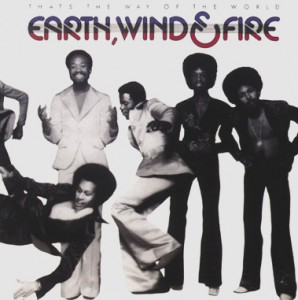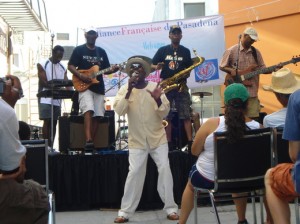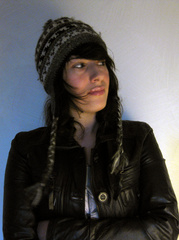UNDER COVERS VOLUME 4
posted in: Features • Music News
Welcome to the fourth installment of “Under Covers,” a biweekly column dedicated to exploring the musical possibilities of artists appreciating one another’s work on both the OurStage and national levels!
The month of September has always been a favorite of mine. Partly because it’s my birthday month, but more so because of the unique time of year it occupies. For students, it’s a reunion before classes get too serious, and in some ways just a prolonged continuation of summer fun. For sports fans, the MLB pennant race is heating up just as the NFL and NCAA football seasons get underway. And for us New England outdoor enthusiasts, the cooler temperatures and prematurely changing leaves make outside activities all the more enjoyable. Simply put, September is a month I look forward to all year long, so I have decided to honor it in this week’s edition of “Under Covers.”

Earth, Wind & Fire
A multitude of songs entitled September subsist in the land of tunage ”both outside and inside the realm of OurStage. For the most part, they deal extensively with the two moods mentioned above; excitement with the dawn of a new season and relaxation with the soothing passage of a scalding summer. Perhaps offering the best sonic documentation this bliss can deliver is September by Earth, Wind & Fire.
EWF was a funk powerhouse in the 1970s. Bridging funk with gospel, rock, pop, and eventually disco, the band’s sound inevitably transformed into a hodgepodge of lovable genres; genres that proved pleasing in isolation but addicting in marriage. When these styles are crafted together by master arrangers, performed by fantastic musicians, sung with what is perhaps the sunniest falsetto on the face of the planet, the result is music magic. The first single off the band’s ARC label, September appeared at the end of the decade. Sung in past tense, it can be viewed as both a remembrance of nostalgic memories and/or motivation to look forward to the future. It is the perfect hybrid of sorts, combining the brass heavy funk groove of the early 70s with the straight ahead disco percussion audible in the latter years of the decade. Luckily, this song’s euphoric energy has not gone unnoticed in the realm of OurStage.

Panache Band
In my opinion, the best cover of this song on the site is performed by OurStage artist Panache Band. They open the song with solo piano instead of two guitars like the original, allowing the listener to hear all moving parts in one place. Moreover, the method of recording used for this introduction, and the addition of dissonant notes, makes the piano sounds natural and sophisticated. They alter the brass as well, manipulating the opening horn riff just enough to make it unique from the original, a trend that develops throughout the piece; similar sounding enough to create the same energy and feeling, but imaginative enough to gloat about its own knack. The most unattainable disparity between this rendition and the 1979 version is the singing. Obviously, Maurice White’s vocal ability is nearly impossible to replicate. Instead of trying to perfect the falsetto, Panache Band singer Johan belts the lyrics out in a lower octave. And though at first this may seem like a cop out, it adds a raspy strength to the vocal line that’s absent in the original. Besides, the overflowing brass section adequately compensates for any lacking high frequencies. Lastly, they lay the icing on the funk cake with quietly lurking organ riffs throughout”a perfect wildcard addition to make the song their own.

Fiona Apple
Laying low on the other side of the September musical mood spectrum is Fiona Apple. This woman has worn many musical masks throughout her all too brief career, yet no matter the mask one thing remains understood: Fiona Apple is a musical and lyrical genius. Whether softly lamenting about personal issues or viciously berating ex lovers, this woman has the rare artistic ability to make it known that her feelings are genuine without overdoing it. Her song Pale September” is two faced; one half summer fading into darkness As the embers of the summer lost their breath and disappeared/ my heart went cold and only hollow rhythms/ resounded from within, and the latter half revolving around letting her guard down And my winter giving way to warm/ I’m singing him to sleep. As a whole, the song is about her personality growing cold and protected with the departure of summer’s sun, then re-blossoming once more with a beautifully naí¯ve man entering into her life, a man whose innocence allows her to recover an innocent part of herself previously thought to have vanished during adolescence. The end product of these separate parts is an emollient resolve; a chanteuse capable of peacefully sitting back and watching the leaves change, content with the way things are.
As the opening lyrics to Pale September will suggest, Ms. Apple was on the path to depression until her hero appeared. Because topics of hopelessness and skepticism are found in all music, I thought it would be healthy to have an OurStage artist with songs of hopelessness cover a heartwarming song originally composed by an artist who once came from the same perspective. As a child, OurStage artist Julie Peel would go on daylong bicycle excursions into the country, always returning as promised at the end of the day. It’s my guess that this is how she chose to unwind.

Julie Peel
But, as her song Unfold implies, the act of relaxing and looking towards the future has become increasingly trying with age: I feel lost/ lost like I’ve never been before/ I can’t unfold and my dreams all gone and buried. Covering Fiona’s soothing Pale September might help to ease some of her doubts. Using the same instrumentation she employs on Unfold, I would have her replace Apple’s piano with her own guitar. Yes, translating Apple’s complex chords and intricate passing tones to six strings would prove a gargantuan task, so slightly simplified voicing would suffice. Besides, the song might sink even a little further into the relaxation ambience if the chords were diluted. I also like the idea of transplanting the minimal percussion from Unfold (tambourine, brushes, hand and bass drums) over to Pale September. Apple’s percussive piano playing does enough on its own to keep the song moving, these background noises would just lend the song some percussive texture. There is a gorgeous but barely audible mallet instrument put to use in Pale September. Not completely distinguishable from the other, louder instruments, it deserves more attention. To remedy this, I would swap it for the synthesized harp sound in the choruses of Unfold, an instrument with a larger range that would resonate above all the other mid-frequency tones in the song. I think the strings in Fiona’s work are arranged flawlessly, but they could be expanded upon. During the break between every chorus and verse, the cello does nothing but trudge on the same two notes repeatedly. I would have the string players from Peel’s group shake them up a little bit during these repeated instrumental spans, show off their sonically decorous abilities.
The ninth month of the ninth year in this new millennium is finally upon us. Go celebrate it with your favorite September songs! If you have a topic for Under Covers or know artists that you would like to cover or be covered, leave a comment about them below!

